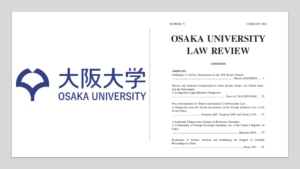Views
Colonialism and German Private International Law – Introduction to a Post Series
In March 2023 I gave a talk at the conference of the German Society of International Law. The conference had the title “Colonial Continuities in International Law“ and my presentation focused on “Continuation of colonialism in contemporary international law? – Foundations, structures, methods from the perspective of PIL“. Thus, I was exploring those foundations, basic structures, and fundamental methods of mainly German Private International Law (PIL) and whether and how they have been influenced by colonialism.
French Cour de cassation rules (again) on duty of domestic courts to apply European rules of conflict on their own motion
 In the Airmeex case (Civ. 1re 27 septembre 2023, n°22-15.146, available here), the French Cour de cassation (première chambre civile) had the opportunity to rule on the duty of domestic courts to apply European rules of conflict on their own motion. The decision is a great opportunity to discuss the French approach to the authority of conflict-of-laws rules.
In the Airmeex case (Civ. 1re 27 septembre 2023, n°22-15.146, available here), the French Cour de cassation (première chambre civile) had the opportunity to rule on the duty of domestic courts to apply European rules of conflict on their own motion. The decision is a great opportunity to discuss the French approach to the authority of conflict-of-laws rules.Postmodernism in Singapore private international law: foreign judgments in the common law
Guest post by Professor Yeo Tiong Min, SC (honoris causa), Yong Pung How Chair Professor of Law, Yong Pung How School of Law, Singapore Management University
Merck Sharp & Dohme Corp (formerly known as Merck & Co, Inc) v Merck KGaA (formerly known as E Merck) [2021] 1 SLR 1102, [2021] SGCA 14 (“Merck”), noted previously, is a landmark case in Singapore private international law, being a decision of a full bench of the Court of Appeal setting out for the first time in Singapore law the limits of transnational issue estoppel. It was also the beginning of the deconstruction of the common law on the legal effect to be given to foreign judgments. Without ruling on the issue, the court was not convinced by the obligation theory as the rationale for the recognition of foreign in personam judgments under the common law, preferring instead to rest the law on the rationales of transnational comity and reciprocal respect among courts of independent jurisdictions. There was no occasion to depart from the traditional rules of recognition of in personam judgments in that case, and the court did not do so. However, the shift in the rationale suggested that changes could be forthcoming. While this sort of underlying movements have generally led to more expansive recognition of foreign judgments (eg, in Canada’s recognition of foreign judgments from courts with real and substantial connection to the underlying dispute), the indications in the case appeared to signal a restrictive direction, with the contemplation of a possible reciprocity requirement as a necessary condition for recognition of a foreign judgment, and a possible defence where the foreign court had made an error of Singapore domestic law.
News
HCCH about to establish Regional Office for Africa (ROAF)
As was mentioned before on this blog, increasing the participation of African states in the HCCH appears to be the most promising avenue to strengthen judicial cooperation on the African continent in the context of intracontinental, interregional as well as global judicial integration. Following several unsuccessful attempts to establish a physical presence on the African continent,[1] the HCCH Council on General Affairs and Policy (CGAP) has now warmly welcomed the Kingdom of Morocco’s proposal to host and, perhaps most importantly, entirely fund a HCCH Regional Office for Africa (ROAF) in Rabat.[2] Read more
Out Now: The Latest Issue of the Japanese Yearbook of International Law (Vol. 67, 2024)
 The Japanese Yearbook of International Law (JYIL) is a leading reference publication that provides in-depth analysis and commentary on developments in international law from a Japanese perspective.
The Japanese Yearbook of International Law (JYIL) is a leading reference publication that provides in-depth analysis and commentary on developments in international law from a Japanese perspective.
Published by the International Law Association of Japan since 1957 (originally as the Annual Yearbook of Private International Law until 2007), the JYIL covers a broad spectrum of topics, from public and private international law to comparative law, bringing together insights from top scholars and legal experts in Japan and beyond.
Each issue dives into key legal cases, legislative updates, and emerging trends, making it a must-read for researchers, academics, and professionals looking to stay in the loop on Japan’s legal landscape.
On that note, the latest volume of the JYIL (Vol. 67, 2024) has recently been released. Readers of this blog may find particular interested in selected articles, case notes, books review and English translations of court decisions related to private international law.
New Titles on Conflict of Laws in the Latest Issue of the Osaka University Law Review

The OSAKA UNIVERSITY LAW REVIEW (OULR) is a prestigious international academic journal on law and politics with a rich history. Published annually by the Graduate School of Law and Politics at Osaka University since 1952, the OULR offers a valuable platform for discussing and sharing information on Japanese law and politics, all presented in English and other foreign languages including French and German from a comparative law perspective.
The OULR’s ultimate goal is to foster debate and facilitate the exchange of ideas between Japanese and international scholars, while promoting and disseminating original research in the fields of Japanese law and politics and other related areas.
That said, the latest volume (No. 72) features some papers that might be of interest to the readers of this blog, as well as researchers and practitioners of private international law. These papers highlight important legal developments in China, particularly in the areas of international civil procedure and sovereign immunity.



